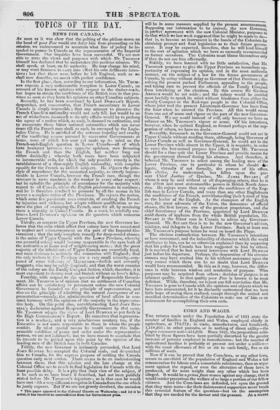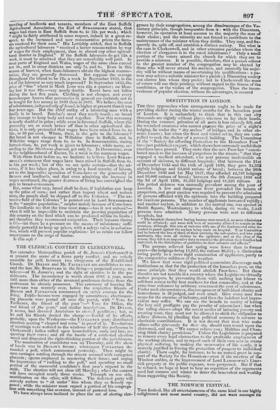CORN AND WAGES.
Tim returns made under the Population Act of 1821 state the number of families in England and Wales, employed chiefly in agriculture, at 773,772 ; in trade, manufactures, and handicraft, 1,118,29:5 ; in other pursuits, or in nothing of direct utility—the fruges consuntere nati-454,690. Since 1821, the proportions exhi- bited by these figures have been partially disturbed by the greater increase of persons employed in manufactures; but the number of agricultural families is probably at present not under a million- with time usual allowance of five or six to each family, five or Ks millions of souls.
Now if it can be proved that the Corn-laws, or any other laws, secure to one-third of the population of England and Wales a far remuneration for labour and a comortable subsistence, then an argu- ment against the repeal, or even the alteration of those laws, is produced, of far more weight than any other which has been alleged. It would be a prima facie reason against any change, that it would render precarious the welfare of so large a portion of our fellow citizens. And the Corn-laws are defended, not upon the ground that they raise rents—for their disinterested supporters never touch this essential feature of the question—but on the assumption that they are needed for the farmer and the peasant. At a recent meeting of landlords and tenants, members of the East .Suffolk Agricultural Association, the Earl of STRADDROKB stated, that wages had risen in East Suffolk from 8s. to 12s. per week; which "might be fairly attributed in some respect, indeed in a great re- spect, to the increased and now remunerative prices the farm- ers received for their corn." His Lordship added, that in Suffolk the agricultural Labourers "received a better remuneration by way of wages for their employment, than in almost any other agricul- tural district in England.' If the Suffolk labourers do get 128. a week, it must be admitted that they are remarkably well paid. In most parts of England and Wales, wages of the same class exceed not 9s., and in many districts are only is. and 8s. Even in this season of harvest, when farm-labourers obtain the highest remune- ration, they are generally distressed. But suppose the average throughout the island to be 12s. a week in September 1839, is the lst of the labourer so very much improved? In September 1835, the price of "fine" wheat in Mark Lane was 428. a quarter; on Mon- day last it was 82s.—very nearly double. Rents have not fallen during the last five years. Clothing is not cheaper, and every housekeeper knows that necessaries in general are certainly not to be bought for less money in 1839 than in 183.5. We believe the cost of subsistence, independently of bread, is higher at present than it was four years ago. But the chief outlay of a labouring man with a family is in bread. Butcher's meat they rarely touch ; on bread they manage to keep body and soul together. Now this necessary is nearly doubled in price ; while even in favoured Suffolk, where the peasantry are so much better off than in other agricultural dis- tricts, it is only pretended that wages have been raised from 8s. to 12s., or 50 per cent. Where, then, is the gain to the labourer ? But bread is not cheaper in Wiltshire than in Suffolk, and in Wiltshire wages range from Gs. to 8s. In Somersetshirc, during harvest-time, 8s. per week is given to labourers ; while many, ac- cording to the Sherborne Journal, get only 7.s. In Devonshire, even in the neighbourhood of Exeter, 7s. a week is time common wages. With these facts before us, we hesitate to believe Lord STRAD-. unoee's statement that wages have been raised in Suffolk from 8s. to 128. per week ; but of this we are quite certain—that the ad- vance, if it has taken place, is owing to a local scarcity of labour, not to the imperative operation of Corn-laws or the generosity of fanners and landlords, and that even admitting the increase in wages mentioned, the greater dearness of living has outweighed the gain to bread-consumers.
But, come what may, bread shall be dear, if legislation can keep up the price of corn ; and rather than import wheat and reduce rents, the people shall be shipped off to the Colonies. " The ex-
tensive field of the Colonies" is pointed out by Lord STRADBROKE to the "surplus population ; " surplus mainly because of Corn-laws. The landlords sec that the time must come—has it not arrived?—
when it will be impossible to maintain the growing population of this country on the food which can be produced within its limits ;
and therefore they recommend emigration. Their humane theory is this—let there be a pressure on the means of subsistence suffi- ciently powerful to keep up prices, with a safety- valve in coloniza- tion, winch will prevent popular explosion : let us retain our fellow countrymen on the verge of famine.
Is this stye



























 Previous page
Previous page